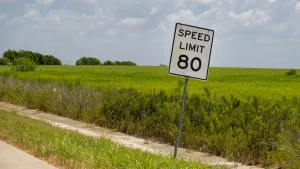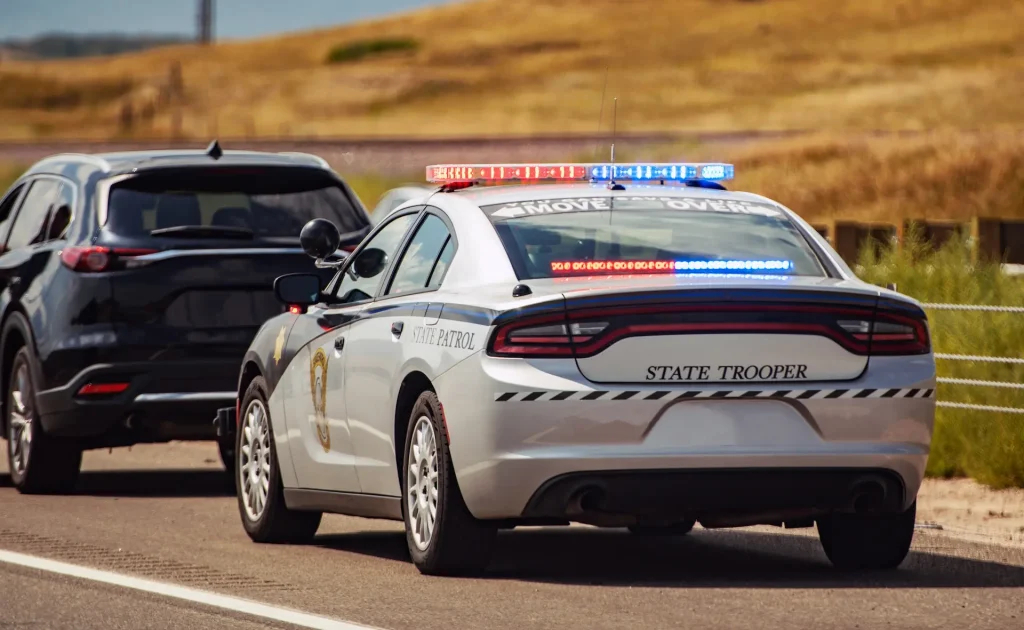Texas Speeding Laws

Speeding might seem like a minor traffic violation, but in Texas, it’s taken seriously. It is classified as a criminal offense that can have significant consequences beyond just a fine. The law aims to protect all road users by enforcing speed limits designed to ensure safety and prevent accidents.
If you’re caught speeding, you could face various penalties, including fines, points on your driving record, and even higher insurance rates. In more severe cases, especially if speeding leads to dangerous situations or accidents, the consequences can be more severe, including potential jail time.
Understanding Texas speeding laws is crucial for all drivers, whether you’re a long-time resident or just passing through. If you require guidance after being involved in a speeding incident, reach out to The Callahan Law Firm – by knowing the rules and potential consequences, you can make informed decisions that keep you and others safe on the road.
Legality of Speeding in Texas
Speeding is considered a criminal offense under the Texas Traffic Code. The fines for a first-time speeding ticket can vary depending on how much you exceeded the speed limit.
Typically, a first-time offense might result in a fine ranging from $150 to $300, but the amount can be higher if you were significantly over the speed limit. The exact fine will depend on factors such as the speed zone you were in and whether there were any aggravating circumstances, like speeding in a construction or school zone.
There are ways to potentially lower the fines of a feeding ticket. One option is to take a defensive driving course. In many cases, completing an approved defensive driving course can reduce your fine and may even prevent points from being added to your driving record. This option is often available to first-time offenders or those with a relatively clean driving history.
If you’re facing financial hardship, you may qualify for a reduction in fines by demonstrating indigent status. Courts may offer payment plans or reduced fines based on your financial situation, but you must provide proof of your income and expenses to be considered.
By exploring these options, you may be able to lessen the financial impact of a speeding ticket while also keeping your driving record in better shape.
Impact of Multiple Violations
Repeated speeding violations can have a cumulative effect on your driving record, including:
- Driving Record: Repeated violations can lead to more points on your license.
- Insurance Rates: Higher premiums due to a history of speeding.
- Felony Speeding: Speeding becomes a felony in extreme cases, such as when it leads to significant harm or danger.
Understanding the Texas speeding laws and the impact of these violations can help you avoid serious consequences.
Arrest for Speeding in Texas
While most speeding violations result in fines, there are specific circumstances where speeding can lead to an arrest in Texas:
- Severe Excessive Speeding: If you’re caught driving significantly over the speed limit in a manner that endangers others, law enforcement may arrest you for reckless driving. This is more serious than a standard speeding ticket and can result in criminal charges.
- Multiple Violations: Repeated speeding offenses, especially when they lead to dangerous driving, can escalate to arrest. Chronic offenders may face increased scrutiny from law enforcement.
- Additional Offenses: If your speeding is accompanied by other illegal activities, such as driving under the influence or driving with a suspended license, you could be arrested on multiple charges.
Court Appearance and Speeding Tickets
If you receive a speeding ticket in Texas, depending on the severity, you may be presented with the following options:
- Mandatory Appearance: For certain speeding violations, especially those involving higher speeds or additional charges, you may be required to appear in court. Check your ticket or contact the court to confirm if you need to attend.
- Non-Mandatory Appearance: For some minor speeding infractions, you might have the option to resolve the ticket without a court appearance, typically by paying the fine online or by mail.
How an Attorney Can Help You
Enlisting the help of a seasoned attorney can make all the difference. Here is how we support you:
- Legal Counsel: Attorneys experienced in traffic violations can offer valuable advice on how to handle your speeding ticket. They can help you understand your options, including whether to contest the ticket or seek a reduction in fines or points.
- Representation: If you decide to contest your ticket or face more serious charges, an attorney can represent you in court, negotiate with prosecutors, and work to achieve a favorable outcome.
Consequences of Missing Court Dates
Failing to attend your court date for a speeding violation can lead to serious consequences, including:
- Warrants: Missing a court date often results in a bench warrant for your arrest. This means law enforcement can arrest you at any time, and your failure to appear will be recorded on your criminal record.
- Increased Fines: Courts may impose additional fines or penalties if you miss your scheduled hearing, further increasing the financial impact of your speeding violation.
- License Suspension: Not attending your court date can lead to a suspension of your driver’s license, which can affect your ability to drive legally until the matter is resolved.
Being aware of these consequences underscores the importance of addressing speeding violations promptly and attending all required court appearances.
Impact on Driving Records
In Texas, speeding convictions and arrests can significantly impact both your driving and criminal records. When you’re convicted of speeding, points are added to your driving record, which can accumulate over time. If you collect too many points, you may face license suspension and higher insurance premiums, as insurers often view speeding violations as a sign of risky driving behavior.
Beyond the driving record, some speeding violations – especially those involving excessive speeds or reckless driving – can result in misdemeanor convictions. Such convictions become part of your criminal record, potentially affecting future employment opportunities and background checks. If you’re arrested for a severe speeding offense, this arrest will also appear on your criminal record, carrying even more serious implications.
However, there is a possibility of expunction for certain speeding-related arrests in Texas. Expunction allows for the removal of specific arrests from your criminal record, typically in cases where charges were dismissed or other legal conditions were met. The expunction process generally requires the help of an attorney, but if successful, it can help you clear your record and mitigate the long-term effects of a speeding arrest.
The 10% Speed Rule
In Texas, there’s a commonly referenced guideline known as the 10% speed rule, though it’s important to note that this is more of an informal understanding than an official law. The idea is that drivers may sometimes exceed the speed limit by up to 10% without facing enforcement. However, relying on this rule is risky, as enforcement is ultimately at the discretion of law enforcement officers, and exceeding the posted speed limit can still result in a citation.

Other Speed-Related Offenses in Texas
In addition to standard speeding tickets, Texas law addresses several other speed-related offenses that can carry severe penalties:
1. Reckless Driving
Reckless driving in Texas involves operating a vehicle with a willful disregard for the safety of persons or property. This includes excessive speeding, aggressive driving behavior, or engaging in dangerous maneuvers. Reckless driving is classified as a Class B misdemeanor. Penalties can include:
- Fines: Up to $2,000.
- Jail Time: Up to 180 days in county jail.
- Driving Record: Increased points on your driving record and potential license suspension.
- Insurance Rates: Significant increases in insurance premiums due to the severity of the offense.
2. Felony Charges for Speeding Violations
Speeding violations can escalate to felony charges under certain circumstances, such as:
- Repeated Offenses: Persistent excessive speeding or repeated reckless driving may lead to felony charges, particularly if combined with other serious violations.
- Causing Injury or Death: If excessive speeding results in an accident causing serious injury or death, charges can be elevated to felony offenses. This includes charges like vehicular manslaughter or aggravated assault, depending on the circumstances.
- Extreme Cases of Reckless Driving: Particularly egregious instances of reckless driving, where extreme danger is posed to others, can also result in felony charges.
Understanding these speed-related offenses and their potential escalation to felonies can help drivers recognize the seriousness of certain driving behaviors and the legal consequences they may entail.
Navigating Speeding Laws In Texas
Adhering to speeding laws in Texas is crucial for maintaining safety on the road and avoiding legal complications. By understanding the fines, potential penalties, and the serious implications of offenses like reckless driving, you can better manage the risks associated with speeding. Speeding affects not just your wallet but also your driving record and, most importantly, public safety.
If you’re facing a speeding ticket or have questions about traffic laws, don’t hesitate to seek legal advice. The Callahan Law Firm is here to help you navigate Texas traffic laws and protect your rights on the road. Contact us to schedule a no-fee consultation, and let us see how we can help you.
FAQ:
How fast can you go over the speed limit in Texas?
There’s no “safe” amount over the speed limit in Texas. Any speed exceeding the posted limit is illegal and can result in a ticket. Penalties increase with higher speeds, and even one mph over can technically lead to a citation.
Can you go to jail for going 30 over the speed limit in Texas?
While it is uncommon, it’s possible to face jail time for going 30 mph over the limit, especially if coupled with reckless driving or in special zones. Most often, it results in hefty fines and potential license suspension, but an arrest is within an officer’s discretion.
Is Texas strict on speeding?
Yes, Texas takes speeding seriously. With fines up to $500, potential license suspension for repeat offenders, and enhanced penalties in school and construction zones, Texas enforces speed limits rigorously to maintain road safety and reduce accidents.

Michael S Callahan is an attorney and founder of The Callahan Law Firm. He focuses his practice on representing individuals and families in personal injury cases involving motor vehicle and truck accidents, workplace accidents and defective products. With over 25 years of experience, he is dedicated to fighting on behalf of people whose lives have been forever altered by the negligence and carelessness of corporations and individuals. Originally trained as a mechanical engineer, Michael has been practicing law and fighting for justice for those who need it most since 1994. He is board-certified in Personal Injury Trial Law by the Texas Board of Legal Specialization and a member of various esteemed legal associations. Outside of work, Michael enjoys spending quality time with his family, outdoor activities, and continually striving to improve as a trial lawyer and human being.











